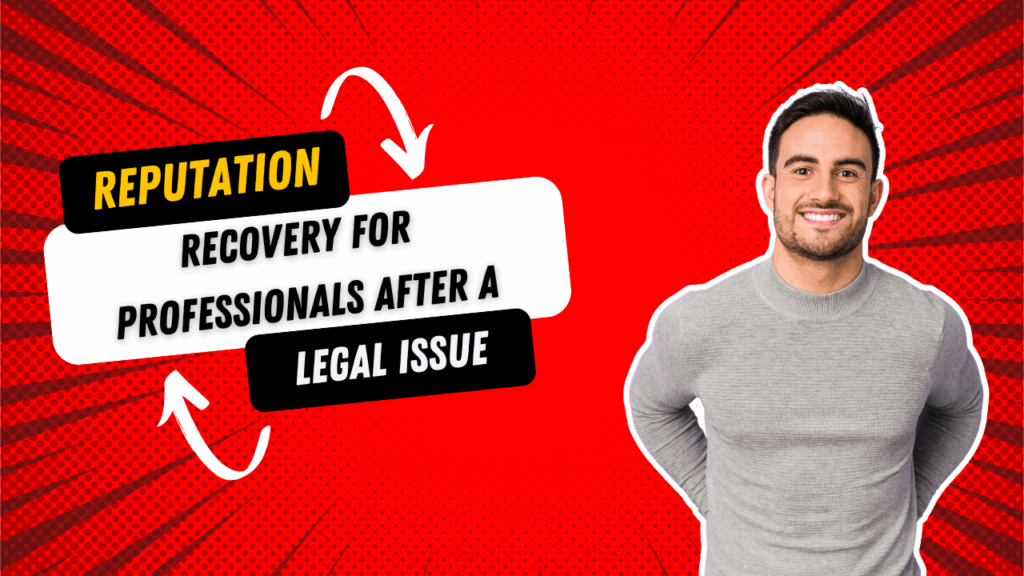Doctors, lawyers, and executives live in the spotlight. When something goes wrong, it goes online fast. A legal issue, even if resolved, can leave a lasting mark on your reputation. If you’re a licensed professional, that mark can hit your bottom line.
But here’s the good news. You can recover.
Dig Deeper: How to Remove Court Records from Google Search
Why Reputation Damage Hits Professionals Hard
Public Trust Matters
Professionals rely on trust. Patients trust doctors. Clients trust attorneys. Investors trust executives. That trust is built on your name. If your name shows up next to words like “arrest,” “lawsuit,” or “sanction,” it can undo years of work.
Online Search Is the New Background Check
According to Pew Research, 91% of adults use a search engine to find information about people. For professionals, that means one article or court record can show up when someone Googles you. One bad link can cost you clients, referrals, and job offers.
Professional Licenses May Be At Risk
Some legal issues trigger automatic reviews by licensing boards. Even if you’re cleared, the investigation can show up in public records. In some states, these records are posted permanently.
What Legal Issues Trigger Online Fallout
Arrests or Criminal Charges
Even if charges are dropped, mugshots and arrest details often stay online. News sites rarely update headlines.
Lawsuits
Civil suits, especially malpractice or fraud, can show up on review boards, court websites, and news blogs.
Disciplinary Actions
If a medical board or bar association issues a suspension or public reprimand, it usually becomes searchable online.
High-Profile Business Disputes
Executives involved in mergers, failures, or SEC filings may end up in the press. These can spread across financial news outlets and investor forums.
Step-by-Step Reputation Recovery Plan
1. Audit Your Search Results
Google your full name and title (example: “Dr. Maria Benson MD” or “James Crawford attorney NYC”). Check the first three pages. Screenshot the results and track what shows up where.
Make a list:
- News articles
- Mugshot sites
- Background check sites
- Court websites
- Review platforms
2. Remove What You Can
Some content is eligible for removal. Here are options:
News Sites
You can request a correction or update. If charges were dropped, ask for a new headline or a note about the outcome.
Background Sites
Submit opt-out forms. Many sites like Whitepages and BeenVerified allow it, but you have to request it.
If your name appears with sensitive personal info (like home address or SSN), use Google’s removal request tool. This only works for certain types of info, but it’s worth trying.
3. Suppress the Rest
You won’t be able to remove everything. That’s where suppression comes in. The goal is to push the bad stuff down in search results by building new, stronger content.
Create:
- A professional website with your name
- Author bios on trusted sites
- Press releases about awards or achievements
- Blog posts that show your thought leadership
- Interviews, Q&As, or podcasts
It helps to use a reputation management service that specializes in this. One example is Top Shelf Reputation. They help clients build new online assets that rank higher than court records or bad press.
4. Own Your Online Voice
Use social media smartly. LinkedIn is your friend. Post regularly. Share articles, case studies, or speaking engagements. Make your name pop for the right reasons.
5. Get Endorsements That Count
Ask colleagues or former clients for testimonials. Publish them on your site. If you can, get them to post on LinkedIn or industry-specific review platforms.
6. Address Licensing Issues Head-On
If you had a license issue, be clear and honest about it when needed. Some people try to hide it, but if it’s public, that won’t work. Prepare a short, honest explanation and move on to your strengths.
Example: “Yes, I was investigated. No charges were filed. I took time to reflect, made adjustments, and returned stronger.”
7. Monitor Constantly
Set up Google Alerts for your name. Monitor news mentions, review sites, and forums. Keep track so you’re not surprised.
Common Mistakes Professionals Make
Ignoring It
Some people hope it goes away. It doesn’t. Inaction makes things worse.
Fighting the Internet
Arguing with bloggers or suing news sites rarely works. It can backfire and draw more attention.
Hiring the Wrong Help
Some reputation services make promises they can’t keep. Look for real results, transparent pricing, and people who understand your profession.
Final Thoughts
Rebuilding your online image is not a quick fix. But it works. One client, a surgeon in California, saw her mugshot vanish from page one after six months of SEO and press strategy. She now ranks for medical awards and public health talks.
If your name matters in your field, you can’t afford to leave your reputation unmanaged. Fix the damage, stay consistent, and show the world what you stand for.
Need help? Top Shelf Reputation specializes in managing court records online, even when they can’t be fully removed. Contact us today to take back control of your online image.

